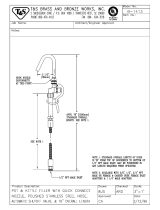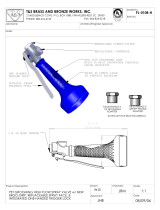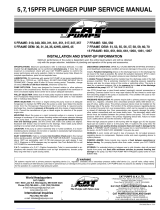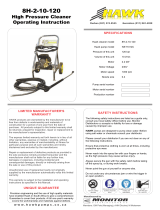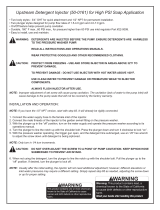Page is loading ...

Rev.
c
ORACO
SUPERSEDES
8
This
manual
mniains
IMPCIRTYNT
WARNINGS
and
INSTRUCTIONS
FIEAD
AND
RETAIN
FOR
REFERENCE
MODEL
800-100
SERIES
"A"
2150
psi
(150
bad
OPERATING PRESSURE
2250
psi
1155
bar1
MAXIMUM
WORKING PRESSURE
GRACQ
INC.
P.Q.
Box
1441
MINNEAPOLIS.
MN
55440-1444
@COPYRIGHT
1981
GRACO
INC.
i
..-

Read and Linderstand all ii;sir!.lcticn
rcanui:/s
before operating equipment.
1
N
j
E
CT
1
3
N
{+
fi
2
A
3
9
~~~~~~~~~~~~~~~~~~~~~~~~~~~~~~~~~~
penetrate the skin and cause extremely serious injury,
Fluids under high pressure from spray or leaks can
including the need for amputation.
NEVER
point the spray gun at anyone or any part of the
body.
NEVER
put hand or fingers over the spray tip.
NEVER
try to stop or deflect leaks with your hand or
body.
ALWAYS
have the tip guard in place when spraying.
MEDICAL
TREATMENT%
If any fluid appears to penetrate your skin, get
EMERGENCY MEDICAL CARE AT ONCE.
Tell the doctor exactly what fluid was injected. For
DO
NOT TREAT AS A SIMPLE CUT.
treatment instructions have your doctor call the
NATIONAL POISON CENTER NETWORK
(412)681-6669
-"a"
*&A&
AVOID COMPONENT RUPTURE
Even after you shut off the gasoline engine, there
is
high
pressure in the pump, hose and gun until you release
it
or servicing the unit,
always
shut off the unit
and
trigger
by triggering the gun.
So
before removing the spray tip
the gun to release pressure.
Be sure that
all
accessory items and system com-
ponents will withstand the pressure developed.
NEVER
exceed the pressure rating
of
any component in system.
NEVER
alter or modify equipment
-
your personal
safety, as well as~the function of the equipment, is
at
stake.
ed conditions caused by traffic, sharp corners, pinching
Before each use, check hose for weak, worn or damag-
or kinking. Tighten all fluid connections securely before
each use. Replaceany damaged hose.
ble with Buna-N and PVC or neoprene cover of hose.
Do
not use chemicals or agents which are not compati-
Do
not leave
a
pressurized unit unattended. Shut off the
unit and release pressure before leaving.
''
engine where combustible fumes or dust may be
Do
not spray flammable liquids.
Do
not operate the
present.
GAS
ENGIME
FRECAUilONSS%
NEVER
fill fuel tank while engine is running or hot.
Avoid the possibility of spilled fuel causing
a
fire.
Always refuel slowly to avoid spillage.
NEVER
operate engine in
a
closed building unless the
exhaust is piped outside. The exhaust contains carbon
which, if breathed, may cause serious illness or possibly
monoxide,
a
poisonous, odorless and invisible gas,
death.
NEVER
make adjustments on machinery while
it
is con-
from the spark plug. Turning over the machinery by
nected to the engine: first remove the ignition cable
hand during adjusting or cleaning might start the engine
and machinery, causing serious injury to the operator.
NEVER
run the engine with governor disconnected, or
operate
at
speeds in excess of
3300
RPM
load.
When starting.the engine, maintain
a
safe distance from
Precaution is the best insurance against an accident.
moving parts of the equipment.
GENERAL
NEVER
run unit with belt guard removed. Keep clear of
moving parts when unit is running.
Observe detergent manufacturer's safety precautions.
Avoid getting detergent or other liquids in your eyes.
Follow the directions on the container regarding contact
with eyes, nose, and skin, breathing fumes, etc. Always
wear full goggles to protect your eyes from the spray as
well as any debris dislodged by the spray.
If
necessary,
wear gloves or other protective clothing. If antidotes or
treatment are recommended, be prepared
to
use them.
DON'T
spray toxic chemicals such as insecticide ar
weed killer.
IMPORTANT
United States Government safety standards have been adopted under the Occupational Safety and Health Act. These
standards
-
particularly the General Standards,
Part
1910,
and the Construction Standards,
Part
1926
-
should be con-
sulted in connection with your use
of
airless spray equipment.
2
801-191
~~

the unit.
Refer to the engine instruction booklet provided with
Install Wheels and Handle
axle and secure with the 1/2 inch locknuts provided.
Slide the axle into the frame. Slide the wheels onto the
and lockwashers provided.
Attach the handle with the
4
screws, nuts, flat washers
Install
Hose
and Spray Gun
Connect the spray hose to the spray gun by inserting
the pin at the end of the hose into the quick disconnect
coupler on the gun. Connect the hose to the fluid outlet
in the same way.
Remove the tape from the cap
on
top of the pump.
Cleaning Accessories
For spraying detergent or other cleaning solution, we
recommend using a chemical injector kit. See Ac-
and operation.
cessories and instruction manual 801-192 for installation
For removing rust
and
old paint we recommend using
a
water sandblaster. See Accessories and instruction
manual 801-190 for installation and operation.
Connect
To
Water Supply
CAUTON
Before attaching to water supply, check local
plumbing code regarding cross-connection to
water supply.
pump in
a
direct supply system.
Do
not exceed 160"
F
(70"
C)
water temperature to
your city water supply to the unit's
3/4
in. garden hose
Connect
a
hose with
at
least
a
3/4
in. (19 mm)
ID
from
threaded inlet. The supply hose should not be more
than
50
ft. (15 m) long.
NOTE:
For
a
direct
SUDO~V
svstem.
your
water
source
at
the unct 'must'have
a
flow
rate of
AT
LEAST5
GPM
(19
LITER/MIN).
contact our Customer Service. Department for
If your operating conditions are different from above.
assistance.
801-191
3

Startup
Before startino. be sure to read the safetv warninos and
setup instruct7ons.
Check the oil and gasoline levels daily
I
Turn on the water supply.
Trigger the gun to release any back pressure
ltVA
8
I?]
I
ihl
G
or triaaered oosition.
Set the choke and open the fuel valve.
NOTE:
For easier starting, hold the gun trigger open
while pulling the rope.
when you'pull the starter rope. Hold the gun in your left
Put your foot on the frame or wheel to steady the unit
hand with the trigger open while starting the engine.
two
or three feet (1 m). Repeat if necessary with the
Grasp the starter rope grip and rapidly pull out the cord
choke opened slightly. When the engine starts, im-
mediately release the gun trigger. Open the choke
gradually.
ICAUTION1
Never run the cleaning unit dry. Costly damage to
the pump will result. Always be sure water supply
is completely turned on before operating.
necessary.
Inspect all connections for .any leaks. Tighten if
Cleaning
For Hvdra-Clean technique, see the Chemical lnjectnr
)2
.
manual.
801-190.
For abrasive cleaning, see the Water Sandblaster
stalling nozzles:
Follow these precautions when removing and in-
1. Shut off the cleaning unit and trigger the gun
to relieve pressure. Engage the trigger safety.
2.
Keep the nozzle and the tube pointed away
from you and everyone else.
3.
Do not put your hand over the tip to push the
nozzle into place. Grasp
it
from the side and
keep your fingers away from the tip.
4.
Do not let anyone else touch the spray valve
while you are cleaning nozzles.
5.
Be sure the slip ring
is
pushed forward to lock
the nozzle in place before triggering the spray
gun.
Shutdown and Care
Of
Unit
When unit is not
in
use, turn off water supply,
When shutting down for the day or weekend, shut
off
unit, shut
off
water supply valve, and trigger gun to
release pressure. Wipe
off
the unit with a damp rag.
4
801.191
~~
r
CAUJION
Shut
off
cleaning unit when not actually spraying,
for longer pump life. The pump will overheat if left
running for over 10 minutes without spraying.
Check the filter screen in the water inlet connection as
often
as
necessary, at least daily.
Do
not operate the
unit with the inlet and filter screen removed.
engine speed. Changing these settings may cause ex-
DO
NOT try to adjust the unloader valve or change the
wasted fuel and increased wear on parts.
cessive pressure, intermittent unloader operation,
PUMP MUST NOT BE RUN
DRY
and must be drained
of water prior to exposure to freezing temperatures. Use
freezing temperatures. If water does freeze in
the
unit,
and store the unit where
it
will not be subjected to
thaw before trying to start. A
50%
anti-freeze solution
may be pumped prior to cold weather storage.
excessive cycling and wear of the unloader valve. See
Use only spray tips that are matched to the unit to avoid
ACCESSORIES.
CAUTION
pour hot water on
a
frozen pump.
A
sudden
temperature change may crack the ceramic
plungers.
Do not pump caustic materials.
Before extended storage, flush the pump with light oil.
Avoid dragging hose over an abrasive surface~such as
cement. This causes excessive wear and shorter hose
life.
Clean the intake line strainer daily.
Lubrication and Care
Change the engine oil after every 100 hours of opera-
tion. Drain oil with engine warm. Engine requires
1
quart
(0.96
liters)
30W
oil. See separate instruction
manual for maintenance procedures.
Fill pump crankcase to dot on oil gauge window with
25
oz.
(0.75
liters) of crankcase oil (part no. 801-1441 or
equivalent
SAE
40
weight hydraulic oil with antiwear
and rust inhibitor additives. Change initial fill after
50
500
hour intervals.
hour running period. Change oil every
3
months or
at
NEVER
alter adjustment
o
valve.
Altering or adjusting unloader will
not
increase
performance
of
unit.
Service of the unloader must be performed only

IOUBLESHOOTING
PROBLEM
Engine Will Not Start
3r Hard To Start.
ingine Misses
Or
Lacks
’ower
-ow Pressure
’ump runs extremely rough,
~ressure low.
Nater leakage from under
he manifold.
Nater
in
pump crankcase.
CAUSE
carburetor.
No gasoline in fuel tank
or
Water in gasoline or old fuel.
Choked improperly. Flooded
engine.
Dirty carburetor air filter
Spark plug dirty or improper
gap.
Spray gun closed.
Partially plugged air filter.
Spark plug dirty, wrong gap,
or wrong type.
Incorrect ignition timing.
Worn nozzle.
Belt slippage.
Air leak
in
inlet plumbing.
Relief valve stuck, partially plug-
ged
or
improperly adjusted;
valve seat worn.
Inlet suction strainer clogged or
improper size.
Worn packing. Abrasives in
pumped fluid or severe cavita-
tion.
Inadequate water supply.
Fouled or dirty inlet or discharge
galves.
Worn inlet or discharge valves.
Leaky discharge hose
Restricted inlet or air entering
the
inlet
plumbing.
Inlet restrictions and/or air
leaks. Stuck inlet or discharge
valve.
Leaking H.P. seals.
Worn packing.
May be caused by humid air
zondensing into water inside
the
crankcase.
SOLUTION
Fill the tank with gasoline, open fuel shut-off
valve.
Check fuel line and carburetor.
and dry spark plug.
Drain fuel tank and carburetor. Use new fuel
Open choke and crank engine several times to
clear out the gas.
Remove and clean.
Clean, adjust the gap or replace.
Trigger spray gun.
Remove and clean.
Clean, adjust the gap, or replace.
Time engine.
Replace with nozzle
of
proper size.
Tighten or replace; use correct belts and replace
both
at
same time.
Disassemble, reseal, and reassemble.
Clean, and adjust relief valve: check for worn
and dirty valve seats.
Kit
available.
Clean. Use adequate size. Check more
frequently.
Install proper filter. Check flow available to
pump.
Clean inlet and discharge valve assemblies.
Replace worn va1ves;valve seats and/or
discharge hose.
Proper size inlet plumbing; check for air tight
seal.
Clean out foreign material, replace worn valves.
Replace seals.
lnsrall new packing.
Change oil at
3
month or
500
Hour intervals
us-
ing
Graco Crankcase Oil (other approved oil
every month or
200
hours) P.N.
801-144.
801-191
5

PROBLEM
Frequent or premature failur
of the packing.
Strong surging
at
the inlet
discharge side.
and low pressure on the
CAUSE
Scored plungers.
Over pressure to inlet manifold.
Damaged or worn plungers.
Abrasive material in the fluid be
ing pumped.
Excessive pressure and/or
temperature of fluid being
pumped.
Over pressure of pumps.
Running pump dry.
Foreign particles in the inlet or
discharge valve, or worn inlet
and/or discharge valves.
NOTE:
A
M11 and M30 metric wrenches are re-
quired for servicing pump.
PUMP
Valves
Photo
1
and
2.
1) Remove the hex duo usino an M30’wrench
2)
Examine O-ring uide; plug &d replace
if
evidence of
3)
Remove valve assembly including retainer, spring,
cuts or distortion.
valve and valve seat from valve cavity.
NOTE:
Valve assembly may come apart during
removal.
4)
Replace valve parts with service kit (80-041)
in-
cluding retainer, spring, valve, valve seat, O-ring and
5)
Replace valve cover and torque to
75
ft-lb (100 N.m).
back-up-ring.
Photo
3.
Pumping Section
2)
Separate the manifold from the crankcase.
1)
Remove the four
(4)
hex nuts from the manifold.
NOTE:
It
may be necessary to tap manifold lightly
with mallet to loosen.
CAUTION:
plungers when removing to avoid damage to
either plungers or seals.
3) Carefully examine each plunger for any scoring and
replace if necessary.
SOLUTION
Replace plungers.
Reduce inlet pressure
Replace plungers.
Install proper filtration on pump inlet plumbing.
:heck pressures and fluid inlet temperature; be
jure they are within specified range.
3educe pressure.
lo
not run pump without water.
:heck for smooth lap surfaces on inlet 2nd
hharge valve
seats.
Discharge valve seats and
stone.
nlet valve seats may be lapped on
a
very fine oil

Photo
4.
Plungers
1) Using an M11 wrench, remove
2)
Slide out the seal retainer with
the plunger retainer.
oil wick and rubber barrier
31
With a slight twisting motion,
slinger.
loosen the plunger from the
plunger rod and remove
NOTE:
The stud may remain
with the retainer when
removed. Disassemble
and screw stud into
tight.
plunger rod finger-
41
Replace O-ring and back
up
ring
51
Saturate new oil wick by soak-
6)
Install new plunger.
71
Replace plunger retainer and
81
Install new oil wick in seal re-
torque to
80
in-lb
(9
N.m).
9)
Replace barrier slinger over new
tainer.
101
Lubricate each plunger sleeve
plunger.
and carefully slide manifold onto
crankcase.
on plunger retainer.
ing
in
oil.
Seals
or
V-Packings
Photo
5,6,7
and
8.
11 Remove C-ring from seal case.
2)
Then remove the low pressure
seal from the seal case.
3)
Unscrew the seal case from the
manifold using
a
special key
wrench (801-044):
Remove the high pressure seal
and examine. Before replacing,
lubricate ID and OD of new
manifold.
highpressure seal and press into
NOTE:
A
socket and exten-
sion may be used to
pressure seal from
~.
manifold.
Install new O-ring on seal case
8
0
V
and lubricate OD-of O-ring.
9)
Lubricate each plunger sleeve 10) Torque
all
four
(4)
bolts to
240
Screw seal case into manifold.
and carefully slide manifold onto
Lubricate ID and OD of low
crankcase.
in-lb
(27
N.m).
pressure seal and press into seal
case.
Replace C-ring holding low
pressure seal in place.
NOTE:
When replacing mani-
NOTE:
Carefully study the order
of respective parts and
note position of seals to
assure proper reassembly
and operation.
fold onto plungers, ex-
treme caution should
be exercised to avoid
damage to the seals.

65

SERVICE TOOLS
KEY WRENCH
801-M4
EXTRACTOR TOOL
801-205
PARTS
LIST
REF PART
NO
3
1
4
5
7
6
8
9
10
11
13
12
15
14
16
17
18
20
19
21
22
23
24
25
26
27
28
29
30
31
33
32
34
35
36
37
39
33
41
40
42
NO.
801"x)
801-003
801
-004
801 -005
801.008
801-012
800-015
801-013
801-128
801-235
801-017
801-018
801-020
801-019
801-021
801-022
801-ow
801 -024
801-025
801-026
801-001
801-027
801-028
801-267
'801-030
'801-031
'801-032
'801-033
'801-035
'801-034
'801-036
'801-037
'801.038
'801-03s
-801-040
801-084
801 -045
801-046
801"
80N"
801-049
DESCRIPTION
QN
CAP
.
O-RING
DISCHARGE MANIFOLD
.WASHER
.
SEAL
.WASHER
,
RETAINER
.
RING, retaining
.WICK
.
PLUNGER
.
STUD
.
O-RING
.
RING, backup
UNLOADER ASSY,
.
RETAINER, plunger
Includes items
38-64
.
CAGE, valve
.
O-RING
SPRING
.
BALL
.
SEAT
2
1
1
1
3
1
2
1
2
1
1
2
1
2
2
5
15
6
11
4
1
1
1
1
3
3
3
3
3
3
3
3
1
1
1
1
1
2
1
1
1
NO.
NO.
REF
PART
DESCRIPTION
ON
43
45
44
53
52
55
54
56
61
62
63
65
64
E6
67
68
69
70
72
73
74
75
78 76
80
82
81
e4
83
85
86
ea
87
a9
90
91
92
93
79
n
800-012
801-050
801.143
801-060
801-061
801
-062
801-063
801-068
801-069
801-071
801-070
800-101
801.085
801-086
801-081'
801-088
'801-090
801-105
801-106
801 -236
801-108
801-110
801-111
801-113
801-112
801.081
801
-082
801-129
801-130
801-131
801-132
801-135
801-136
801-133
801-137
801-139
801-140
801.141
f.
801-1m
.
O-RING
.
UNLOAOER
.
TAG
.
GASKET
.
CYLINDER
.
HOUSING
.
GASKET
.
PLUG
.
HOUSING,
valve
.
SPRING
VALVF
SEnT-
HOSE AND GUN ASSY. see
aun
detail
fn.
nnnc
COVER, belt guard
SCREW, mach. sloned.
1/4 -20
x
1-3/4"
BASE. belt guard
SCREW, mach. cross recessed.
5/16-18
x
l-l/7'
*".._
COGPLER. male quick disconnect
NIPPLE, straight.
brass.
1/2
not
x
3-1/2"
TEE, brass.
172
kpt
NIPPLE, hex. steel,
1/2
x
3/8
npt
NIPPLE, hex, brass,
1/4
x
1/2
npt
PLUG, hex.
brass.
3/8
npt
ADAPTER.
1/2"
garden hose
NUT, brass. garden hose adapter
SCREEN, inlet.
1/2"
HOSE, cpld
1/2
nptlrnbel.
17.1/T'
Ig
SCREW,
mach,
hex
hd:
M6
x
30
mrn
SCREW, mach.
hex
hd;
M80
x
20
mm
LABEL, warning
LABEL. warning
PLATE, serial
RIVET
HUB
KEY, pulley
KEY, pulley
CHASSIS
LOCKWASHER,
1/4"
LABEL,
warning
LABEL.
identification
2
1
1
1
1
1
2
1
1
1
1
1
1
1
1
1
4
1
1
1
1
1
1
1
1
1
2
1
4
1
1
2
1
1
1
1
1
4
1
1
"Recommended "tool box" spare parts. Keep on hand
to
'*Included in repair kit
reduce down time.
number and series /ewer
of
rhe assembly
for
which
you
are
Order parts by name and number. Always give the model
ordering.
801-191
9

19
28
f3
14
5
A
15
L19
REF PART DESCRIPTION
QTY
Repair
Kit
801-083
NO. NO.
Includes items
A,
6,
C.
D,
E
and
F
(15
ml
lg 1
SERVICE
include items 3-16) 1
1.
Remove the
8
screws from
the
body halves
(3)
and
3 801-244
.
HANDLE, left 1
(4).
See
the
Parts Drawing. Separate
the
body
4
801-245
.
HANDLE, right 1
5
801-249
.
SPRING 1
halves.
6
801-254
.
LEVER 1
7
801-256
.
NEEDLE 1
1
9 801-261
.
DISCHARGE FlTlNG 1
1
3.
Remove the snap ring
(61.
Then remove the valve
12
801-246
,
TUBE
1
1
4. Remove the sleeve nut
(11)
and
O-ring
(E)
with
the
14 801-250
.
CAP
15 801.264
.
SCREW
1
actuator rod
(F).
16 801-265
.
SCREW
7
1
17 801.134 TUBE.
32"
1
1
ball lightly
with
a hammer
to
assure a proper seating 19 801-009 COUPLER, female quick disconnect 3
between the ball and seat.
20
'801-090 COUPLER, male quick disconnect
.
1.
22
'801-010 TIP, blasting;
0"
1
1
2
25 801-076
PLATE, warning
26 801-077 RIVET
1
2
27 801-103 NIPPLE, hex; 1/4
x
3/8"
npt; brass 1
28 '801-091 COUPLER, male quick disconnect 2
1 801-007 SPRAY HOSE,
3/8"
ID,
50
ft.
2
800-017 SPRAY GUN, (replaceable parts
2.
Remove the
plug
(141. spring
(5)
and
ball
(AI from
8
801-262
.
HEX PLUG
the
valve body
IG).
10 801-247
.
VALVE BODY
11 801-253
.
GUIDE SLEEVE 1
seat
IC1
and
O-ring
(Dl.
13 801-263
.
INLET FITTING
5.
After installing the
new
seat
(Cl
and
ball
(A),
tap
the
18 801-029 GRIP
21 801-073 HOUSING, nozzle
2
6.
Reassemble
in
reverse order, using the remaining
23
.801.011
TIP,
cleaning;
150
new
parts from
the
repair
kit.
24
801-074 GUARD, tip
Order parts
by
name and series letrer
of
the. assembly
for
which
you
are ordering.
'Recommended "tool
box"
spare
parts.
10
801-191

CHECK VALVE
801-133
CHEMICAL INJECTOR KIT
800-102
supply.
Install
upstream
from
pump.
Prevent
back
up
of
contaminated
water
into
fresh
from
pump.
For
injecting
harsh
cleaning chemicals
downstream
WATER SANDBLASTER
8W-103
For
abrasive
cleaning
of
stubborn
dirt
and
paint
TECHNICAL DATA
ENGINE: HONDA MODEL G4000B6
4
cycle. single cylinder, air
cooled, 10 hp.
GASOLINE TANK:
1.58
gallon 16 liter1
capacity
WATER PUMP:
2150
PSI'1150 bar1 max.
pressure:
4
GPM
115 iiter/minl.
WETTED PARTS: Stainiess Steel, Aluminum,
Phenolic Plastic, Ceramic
Liners. Nitrile Rubber.
WEIGHT: 180 Ib 175 kgllnot in-
cluding gasoline and motor
oill.
OVERALL DIMENSION: Length:
32'
1810
mml
Width:
28"
1710
mml
Height:
25.5'
1650
mml
MAX. WATER TEMPERATURE:
1W"
170'
CI
INLET HOSE CONNECTION:
3/4"
garden hose If1
THE GRACO WARRANTY
Graco Inc. warrants all equipment manufactured by it and bearing its name to
be
free
from
defects in
for
a
period of 12 months from the date of purchase and applies only when the equipment
is
installed and
material and workmanship under normal
use
and service. This warranty extends to the original purchaser
operated in accordance with written factory recommendations. This warranty does not cover damage
or
wear which, in the reasonable judgment of Graco. arises from misuse. abrasion.'corrosion. negligence.
accident, substitution
of
non-Graca parts, faulty installation
or
tampering.
This warranty is conditioned upon the prepaid return of the equipment claimed to be defective for
examination by
Graco
to verily the claimed defect.
If
the claimed defect is verified. Graco will repair
or
replace free of charge. any defective parts. The equipment will
be
returned to the original purchaser
transportation prepaid.
If
inspection of the equipment does not disclose any defect in workmanship
or
material. repairs will be made at
a
reasonable charge and return transportation will
be
charged.
THIS LlMiTED WARRANTY
IS
EXCLUSIVE, AND
IS
IN LIEU
OF
ANY OTHER WARRANTIES
IEXPRESS
OR
IMPLIED) INCLUDING WARRANTY
OF
MERCHANTABILITY OR WARRANTY
OF
FITNESS FOR A PARTICULAR PURPOSE AND
OF
ANY NON-CONTRACTUAL LiABlLlTlES
INCLUDING PRODUCT LlABlLlTiES BASED ON NEGLIGENCE
OR
STRiCT LIABILITY. EVERY
FORM
OF
LiABiLlTY FOR DIRECT, SPECIAL
OR
CONSEQUENTIAL DAMAGES OR LOSS
IS
EXPRESSLY
EXCLUDED AND DENIED.
by
Graco
that
are
not manufactured by Graco lsuch
as
electric motors. switches, hose, etc.1 are subject
EQUIPMENT NOT COVERED BY GRACO WARRANTY. Accessories
or
components
01
equipment sold
to the warranty. if any. of their manufacturer.
Graco
will provide purchaser with reasonable assistance in
making such claims.
Subsidiary and Affiliate Companies:
Canada: England: Switzerland: France: Germany: Hong Kong: Japan
Factocy Branches:
Atlanta, Dallas, Detroit.
Los
Angeles, West Caldweil
IN.J.1
GRACO INC.
P.O.
BOX
1441 MINNEAPOLIS,
MN
55440-1444
PRINTED
IN
U.S.A.
801-191
481
Revised
2-82
45-1[1305
c
/
